 Petzlover
Petzlover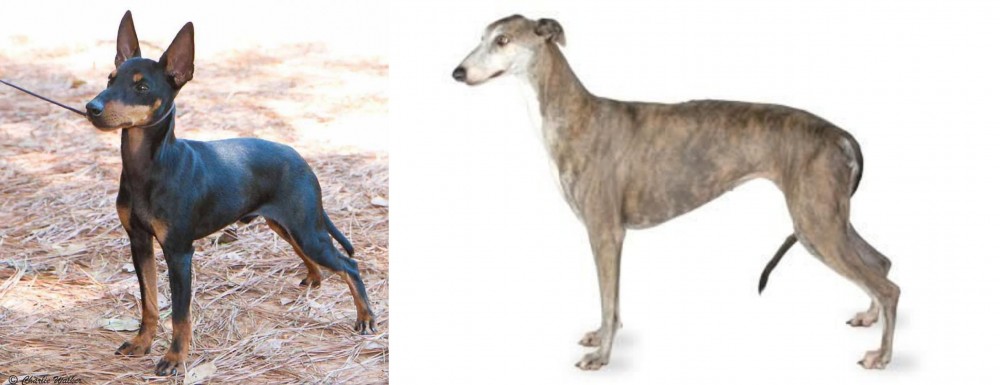 Both English Toy Terrier (Black & Tan) and Greyhound are originated from United Kingdom. English Toy Terrier (Black & Tan) may grow 41 cm / 16 inches shorter than Greyhound. English Toy Terrier (Black & Tan) may weigh 36 kg / 79 pounds lesser than Greyhound. Both English Toy Terrier (Black & Tan) and Greyhound has almost same life span. English Toy Terrier (Black & Tan) may have less litter size than Greyhound. English Toy Terrier (Black & Tan) requires Moderate Maintenance. But Greyhound requires Low Maintenance
Both English Toy Terrier (Black & Tan) and Greyhound are originated from United Kingdom. English Toy Terrier (Black & Tan) may grow 41 cm / 16 inches shorter than Greyhound. English Toy Terrier (Black & Tan) may weigh 36 kg / 79 pounds lesser than Greyhound. Both English Toy Terrier (Black & Tan) and Greyhound has almost same life span. English Toy Terrier (Black & Tan) may have less litter size than Greyhound. English Toy Terrier (Black & Tan) requires Moderate Maintenance. But Greyhound requires Low Maintenance
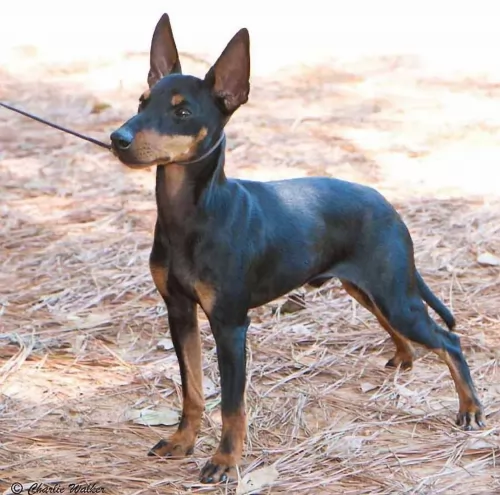 They English Toy Terrier (Black & Tan) is closely related to the Manchester Terrier and the Old English Black and Tan Terrier. The English Toy Terrier was developed to entertain humans in the rat pit due to its speed and agility. This is a sport that was very popular in English cities during Victorian times. Terriers went into the pits with a large number of rats and the winner would be the dog that killed a certain number of rats the fastest. The watchers would take bets on their favorite dog.
They English Toy Terrier (Black & Tan) is closely related to the Manchester Terrier and the Old English Black and Tan Terrier. The English Toy Terrier was developed to entertain humans in the rat pit due to its speed and agility. This is a sport that was very popular in English cities during Victorian times. Terriers went into the pits with a large number of rats and the winner would be the dog that killed a certain number of rats the fastest. The watchers would take bets on their favorite dog.
The English Toy Terrier was developed to be smaller than the Manchester Terrier, because smaller dogs were desired for the pit. In 1848 a small 2.5 kg black and tan terrier took less than an hour to kill 300 rats. When the Kennel Club was formed the sport of rat killing was outlawed. Because it was such a good looking dog, the black and tan was soon excelling in the show ring. To begin with there was one breed of Black and Tan Terriers and two weight classes. In 1920, the two were divided into separate breeds – the Manchester Terrier and the Black and Tan Terrier. It wasn’t until 1962 that the name changed to the English Toy Terrier (Black and Tan).In 1959, the declining numbers of Manchester Terriers caused the AKC to combine them again into one breed with two kinds: Toy and Standard.
Today the English Toy Terrier is one of the most vulnerable of the native breeds and efforts are in place to increase the gene pool and popularity of the dog. The UKC has also re-registered the English Toy Terrier (Black and Tan) in the stud book if it is a certified Toy. The breed is not AKC recognized.
 The Greyhound belongs to a group of dogs known as sighthounds. This is an ancient sighthound breed dating back a few thousands years.
The Greyhound belongs to a group of dogs known as sighthounds. This is an ancient sighthound breed dating back a few thousands years.
The dog has been bred for racing but today is also a popular pet. They’ve also been used for hunting too because of their keen eyesight and sense of smell.
In the United States there are Greyhounds registered with the American Kennel Club as well as those registered with the National Greyhound Association.
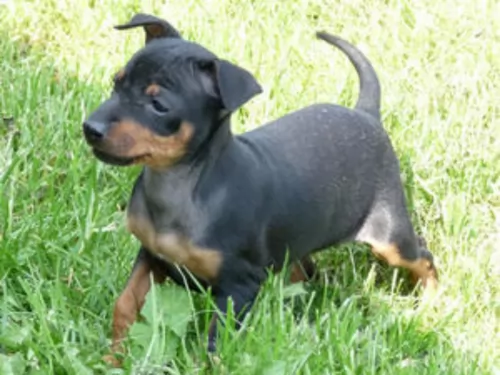 The English Toy Terrier is a small compact breed that resembles the Miniature Pinscher and the Manchester Terrier. The English Toy Terrier has a narrow but long head with a black nose, wedge muzzle and dark, almond shaped eyes. The ears are flame shaped and the chest is deep and narrow. He has thick legs and a tapered tail. The breed is of course black and tan – with the tan on the face, chest and legs.
The English Toy Terrier is a small compact breed that resembles the Miniature Pinscher and the Manchester Terrier. The English Toy Terrier has a narrow but long head with a black nose, wedge muzzle and dark, almond shaped eyes. The ears are flame shaped and the chest is deep and narrow. He has thick legs and a tapered tail. The breed is of course black and tan – with the tan on the face, chest and legs.
 The Greyhound is a tall, muscled, long-legged, slender dog with a flexible spine, a deep chest and exceptional eye sight.
The Greyhound is a tall, muscled, long-legged, slender dog with a flexible spine, a deep chest and exceptional eye sight.
The Males are usually about 71 to 76 cm in height with the females being slightly smaller. The dogs weigh in the region of 27 to 40 kg. The coat of the dog is short and smooth and is found in an assortment of colors, from fawn to white, tan, black and brindle.As far as grooming goes, he is looked upon as a low maintenance breed.
He has a long narrow muzzle, semi-erect/semi-floppy short ears and a long slender tail.
Sometimes referred to as being hypoallergenic, you need to allow your Greyhound indoors as the dog doesn't have an undercoat. He is therefore more susceptible to extreme temperatures. The face is long, narrow and pointed, the ears short and half-erect-half-floppy with a long, thin, whip-like tail.
Intelligent and gentle, the Greyhound is described by those who have owned them as wonderful pet. They are somewhat aloof around strangers but love their own human family. This is a non-aggressive, gentle, docile, calm dog. They are loving and get on well with their entire family, whether human beings or pets.
They’re sensitive dogs who appreciate quiet, calm environments. They may be quiet, but they are still social, loving the company of their family. They’re not great barkers and because they are non-aggressive, they don’t make wonderful guard dogs.
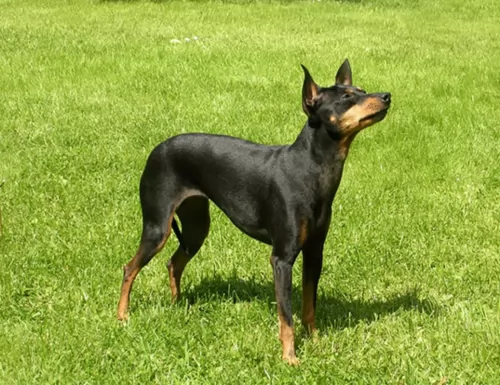 The English Toy Terrier is a stubborn, strong willed little dog. It has a fearless disposition and its alertness make it a great candidate for a guard dog despite its size. They will chase small animals due to their innate prey drive. They are affectionate and loyal and need to be with people. They love to be cuddled and petted, but usually choose one person that they become very close to. He is more than a lap dog. He can be playful, or he can be a small working dog.
The English Toy Terrier is a stubborn, strong willed little dog. It has a fearless disposition and its alertness make it a great candidate for a guard dog despite its size. They will chase small animals due to their innate prey drive. They are affectionate and loyal and need to be with people. They love to be cuddled and petted, but usually choose one person that they become very close to. He is more than a lap dog. He can be playful, or he can be a small working dog.
 The Greyhound, forgetting about the racing part, makes a superb pet too. He won't do well in a household where there are screaming, noisy children and adults as he wants a quiet home to live in.
The Greyhound, forgetting about the racing part, makes a superb pet too. He won't do well in a household where there are screaming, noisy children and adults as he wants a quiet home to live in.
He can get on well with kind, gentle, respectful children as well as with pets in the home. Just like any dog, he will also need training and socialization as this can build up his confidence and then he knows how to please his owners and what they expect.
The Greyhound will require a gentle, fair, kind owner who understands his need for peace and quiet, and then he becomes a most wonderful devoted, loyal and loving pet.
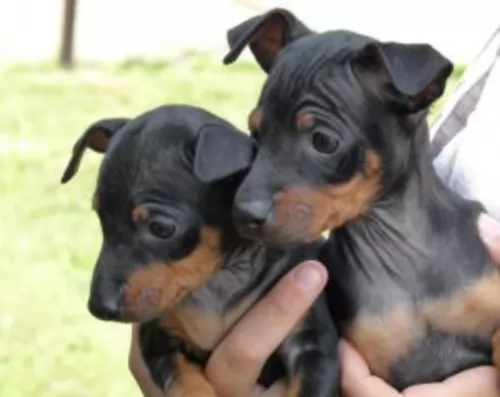 Like many Toy dogs, the English Toy Terrier is susceptible to:
Like many Toy dogs, the English Toy Terrier is susceptible to:
Dislocated kneecap – many small breeds are susceptible to this.
There has been a congenital line of deafness in the English Toy Terrier since it was developed with a cross from the English White Terrier. Unfortunately, some still breed these deaf dogs and continue to pass on the condition.
More painful than in the human eye, pressure builds up behind the eye ball. Dogs build up more pressure than humans and this can lead to blindness.
 Greyhounds are a wonderfully healthy dog breed and with good care can reach 14 years of age. They aren't prone to many genetic illnesses and unlike so many other dog breeds, this is one dog that doesn't battle with hip dysplasia – in fact it is almost unknown among this tall, slim dog breed.
Greyhounds are a wonderfully healthy dog breed and with good care can reach 14 years of age. They aren't prone to many genetic illnesses and unlike so many other dog breeds, this is one dog that doesn't battle with hip dysplasia – in fact it is almost unknown among this tall, slim dog breed.
The Greyhound does however, have a deep chest and this is what makes him vulnerable to bloat or gastric torsion. You have to take action quickly if you detect bloat – the stomach swells up – as this is a life-threatening condition that can occur quickly when air is trapped in the stomach. The stomach can become twisted.
Make sure your Greyhound doesn't gobble his food too quickly and preferably give him smaller meals as opposed to one or two large bowls of food.
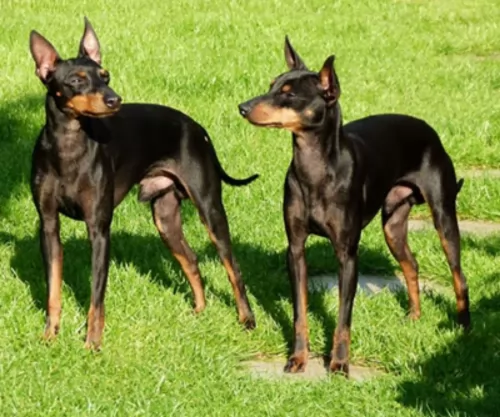 As a high energy small dog feed a high quality dry food that is designed specifically for small dogs. Feed about ¼ of a cup of food split into 2 meals.
As a high energy small dog feed a high quality dry food that is designed specifically for small dogs. Feed about ¼ of a cup of food split into 2 meals.
In addition to the health issues mentioned above:
This is an inherited blood disease in which a lack of protein has a negative effect of the platelets. This causes them not to form clots and so the dog has a bleeding issue.
Degeneration of the femur ball joint due to a blood deficiency issue. This can lead to arthritis.
Affects the lens by blocking the drainage from the eye creating a glaucoma like pressure.
The English Toy Terrier can develop skin issues so watch him closely.
The English Toy Terrier can be very energetic but that doesn’t actually mean she needs a ton of exercise. Because she is small she does not need as much as you might think. A half hour walk once a day is enough or just letting her run in your fenced yard.
He is an intelligent little dog who needs mental stimulation as much if not more than the solution. Play games like catch, hide and seek, frisbee, and performing tricks.
 Your Greyhound’s breeder will be the best guide for the type of- and the amount of dog food your hound will need. Of course, a growing puppy has different nutritional needs from a mature or senior Greyhound.
Your Greyhound’s breeder will be the best guide for the type of- and the amount of dog food your hound will need. Of course, a growing puppy has different nutritional needs from a mature or senior Greyhound.
Growing puppies and young dogs use a lot of energy so they will require a diet rich in protein. According to Greyhound experts, an adult Greyhound dog will need an average daily caloric intake of 1740 calories.
Older dogs and those that have been spayed or neutered will need less. Apart from the very best quality kibble, your Greyhound will most certainly require raw meat from time to time. You can also give him some cooked chicken, vegetables and brown rice. He should have access to a constant supply of fresh, cool water.
The Greyhound's coat is smooth and short and he sheds very little so he will only need a gentle brush-down once or twice a week.
Having a relaxed lifestyle is what your Greyhound will love. He is a dog that needs to spend time indoors. When outdoors, whether you live in the city or the country, he will need daily walks and a run in the park regularly.
Just because he is a sprinter, it isn't wise to take him with you with cycling or jogging as he is geared for a short burst of speed as opposed to a long run.